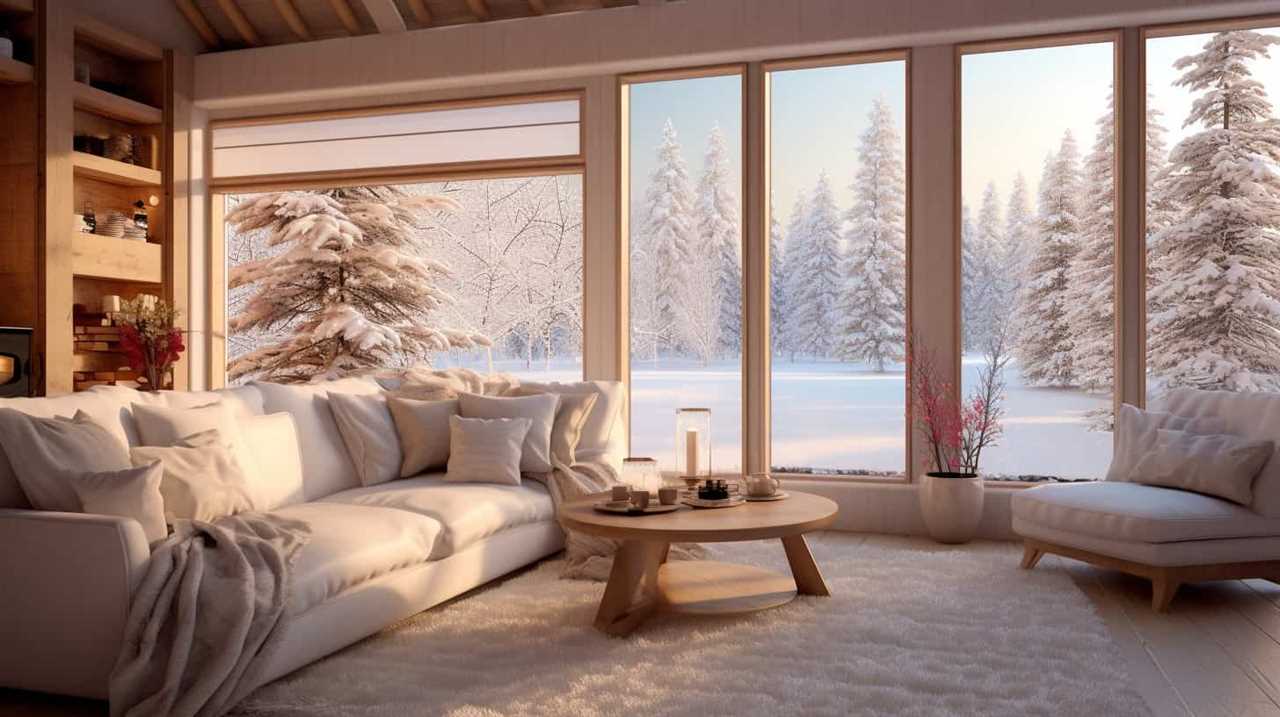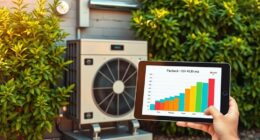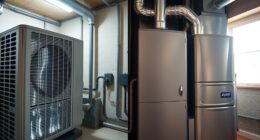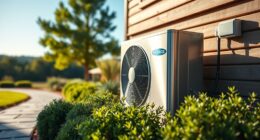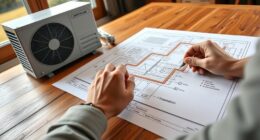Are you fed up with paying high energy bills and dealing with inefficient heating? You’re in luck! We have put together a list of tips to assist you in improving your heat pump’s energy efficiency and cutting costs.
With regular maintenance tasks, optimal temperature settings, and proper insulation, you can improve the performance of your heat pump.
Plus, we’ll show you how to take advantage of rebates and incentives to upgrade to a high-efficiency model.
Let’s start serving you with the knowledge you need!
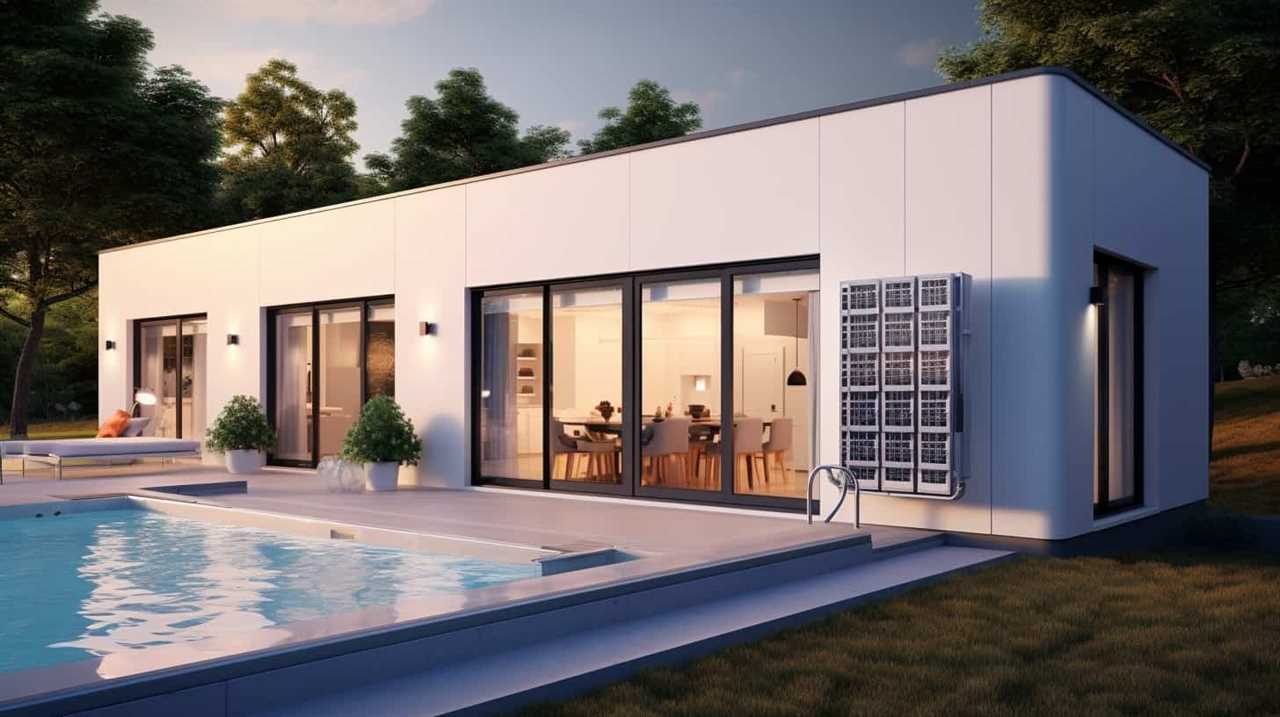
Key Takeaways
- Regular maintenance and filter replacement improve energy efficiency and indoor air quality.
- Adjusting temperature settings and utilizing programmable thermostats can reduce energy consumption.
- Inspecting and sealing ductwork prevents air leaks and improves energy efficiency.
- Proper insulation, ceiling fans, and energy-efficient window treatments contribute to enhanced energy efficiency.
Regular Maintenance Tasks
We should regularly clean the air filters of our heat pump to ensure optimal energy efficiency. Air filters play a crucial role in the functioning of a heat pump by trapping dust, dirt, and other particles that could potentially clog the system. When these filters become dirty or clogged, it restricts the airflow, forcing the heat pump to work harder and consume more energy.
Regularly cleaning or replacing the air filters can significantly improve the heat pump’s performance and energy efficiency. It’s recommended to clean the filters at least once every three months, or more frequently in high-dust environments. This simple maintenance task not only saves energy but also helps to maintain good indoor air quality.
Optimal Temperature Settings
To maximize energy efficiency, it’s important to set the temperature on our heat pump to a specific range and avoid extreme settings. Here are four optimal temperature control techniques that can help save energy:
-
Set the thermostat to a comfortable temperature during occupied hours and lower it by a few degrees during unoccupied periods to reduce energy consumption.

-
Utilize programmable thermostats to automatically adjust the temperature based on your daily schedule and preferences.
-
Maintain a consistent temperature rather than frequently adjusting it, as this can lead to unnecessary energy usage.
-
Take advantage of the heat pump’s ability to both heat and cool your home, allowing you to set a moderate temperature range that suits both seasons.
By implementing these energy-saving techniques, you can optimize your heat pump’s temperature settings and reduce energy consumption.
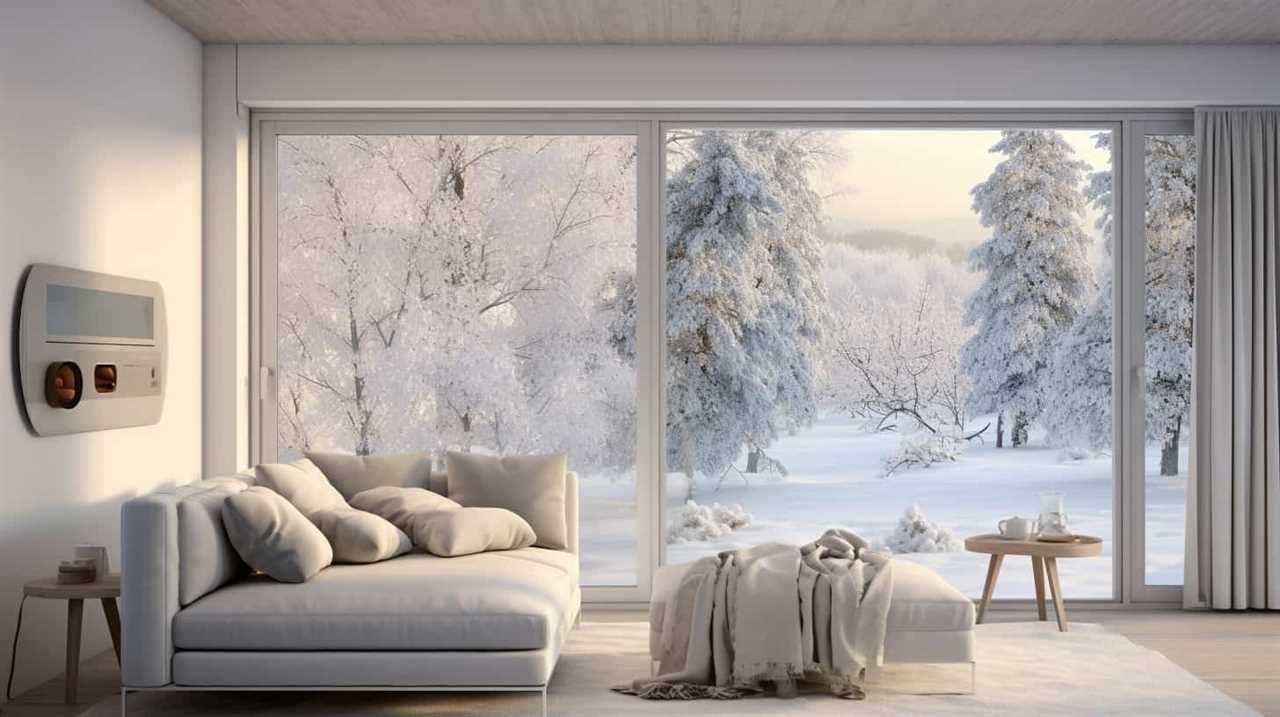
Now, let’s move on to the next topic of air filter replacement, which is crucial for maintaining the efficiency of your heat pump system.
Air Filter Replacement
Regular air filter replacement is a crucial aspect of maintaining heat pump energy efficiency. By ensuring that filters are replaced according to manufacturer guidelines, homeowners can optimize the performance of their heat pumps and reduce energy consumption.
Proper filter maintenance, such as cleaning or replacing filters as needed, can lead to significant energy savings over time.
Importance of Regular Replacement
When it comes to boosting heat pump energy efficiency, one important factor to consider is regularly replacing the air filter. A clean and properly functioning air filter is crucial for ensuring optimal performance and energy efficiency of your heat pump system.
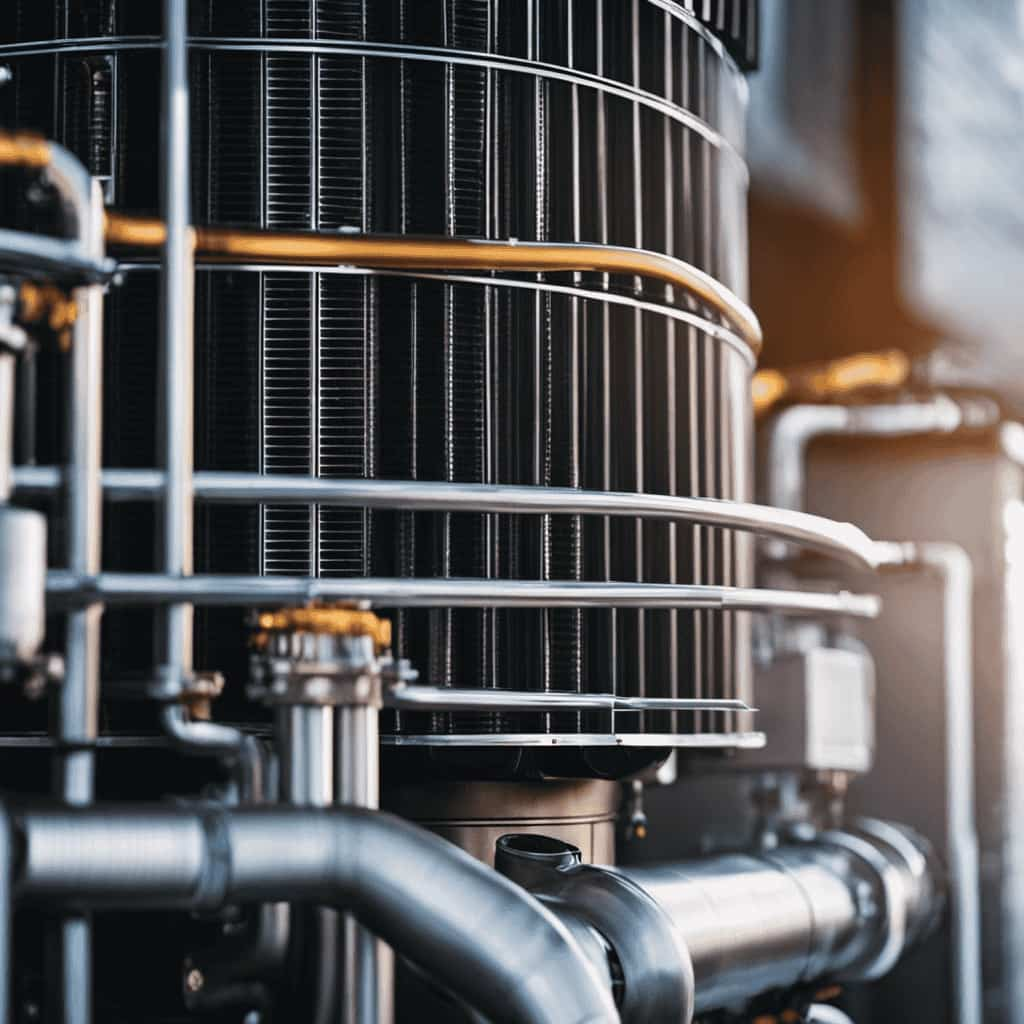
Here are four key reasons why regular air filter replacement is essential:
-
Improved Air Quality: A dirty air filter can accumulate dust, allergens, and other particles, compromising the air quality in your home. Regular replacement ensures cleaner air and a healthier environment for you and your family.
-
Enhanced Energy Efficiency: A clean air filter allows for better airflow, reducing strain on the heat pump’s motor. This improved airflow leads to increased energy efficiency, reducing your energy consumption and lowering utility bills.
-
Extended Lifespan: Regularly replacing the air filter prevents the build-up of dirt and debris on vital components of the heat pump. This helps to extend the lifespan of the unit and avoid costly repairs or premature replacements.
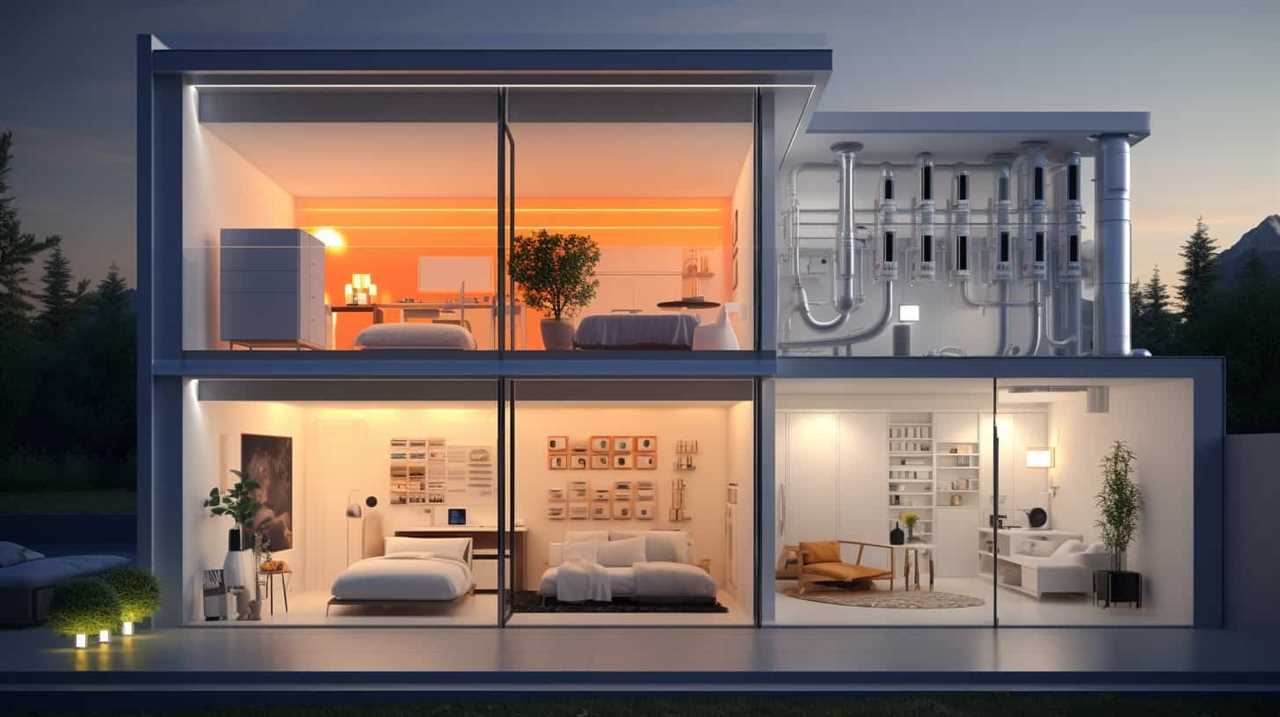
-
Cost Savings: By maintaining a clean air filter, you can maximize the energy efficiency of your heat pump, resulting in significant cost savings over time.
Energy Savings Potential
We should consistently replace the air filter in order to maximize energy savings potential. Regular air filter replacement is an essential part of maintaining the efficiency of a heat pump system.
When the air filter becomes dirty and clogged, it restricts the airflow, making the heat pump work harder to provide the desired heating or cooling. This increased workload leads to higher energy consumption and decreased efficiency. By regularly replacing the air filter, we can ensure that the heat pump operates at its optimal level, reducing energy waste and saving on utility bills.
Additionally, a clean air filter improves indoor air quality by trapping dust, pollen, and other particles. To determine the ideal replacement frequency, consider factors such as the air quality in your area, the number of occupants in your home, and the level of usage.
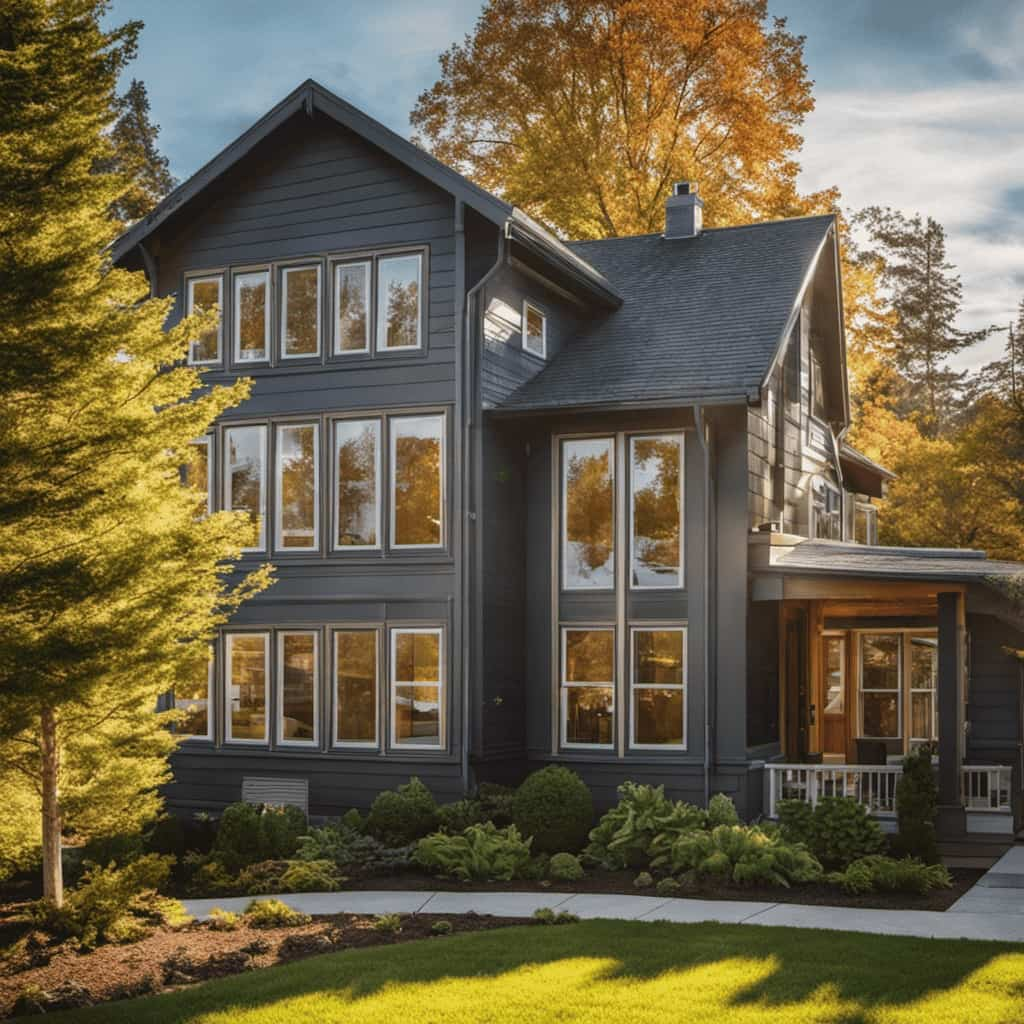
Conducting an energy audit can help identify areas for improvement, including the importance of air filter replacement and insulation benefits.
Proper Filter Maintenance
One important aspect of maintaining energy efficiency in our heat pump system is regularly replacing the air filter. Proper air filter maintenance is crucial for ensuring the energy efficient operation of our heat pump.
Here are four key reasons why regular air filter replacement is important:
-
Improved airflow: A clean air filter allows for better airflow, ensuring optimal performance and efficiency of our heat pump system.
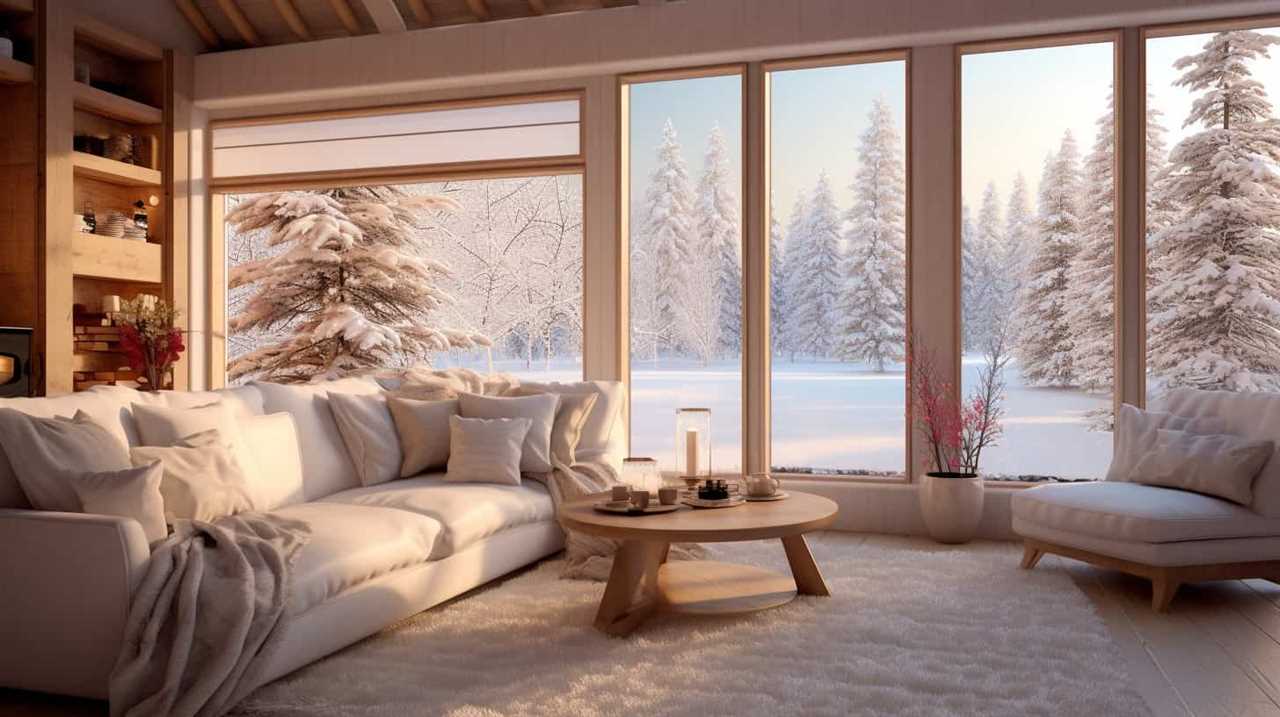
-
Enhanced indoor air quality: A dirty air filter can accumulate dust, allergens, and pollutants, compromising the air quality in our home. Regular replacement helps keep the air clean and healthy.
-
Extended system lifespan: A clogged air filter can strain the heat pump, leading to increased wear and tear. By replacing the filter regularly, we can prolong the lifespan of our system.
-
Energy savings: A clean air filter allows the heat pump to operate more efficiently, reducing energy consumption and lowering utility bills.
By prioritizing air filter maintenance, we can maximize energy efficiency and enjoy the benefits of a properly functioning heat pump system.
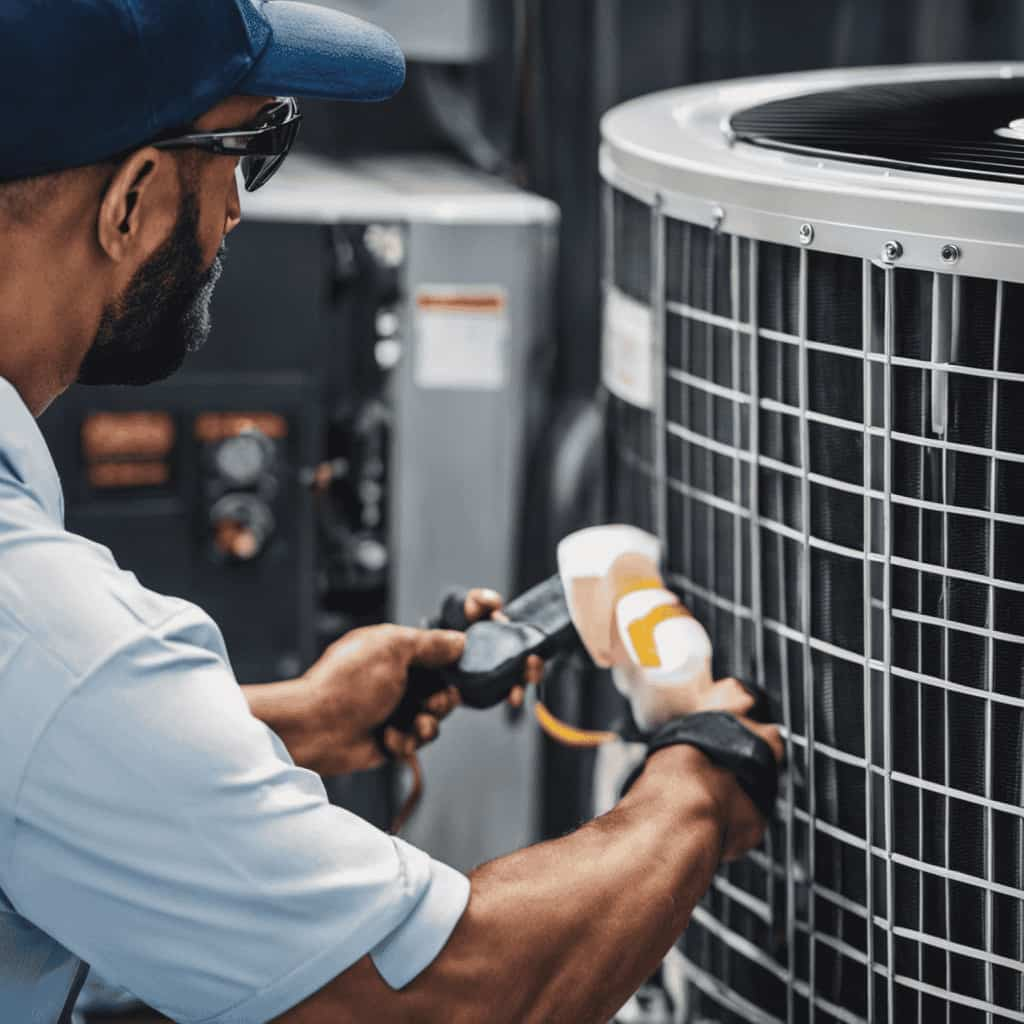
Now, let’s move on to the next topic: proper insulation.
Proper Insulation
To maximize heat pump energy efficiency, it’s essential to ensure that our home has proper insulation in all areas.
One of the main culprits of energy loss in a home is air leakage. This occurs when the conditioned air from inside the house escapes to the outside, or when unconditioned air from outside infiltrates the home. To prevent air leakage, it’s crucial to seal any gaps or cracks in the walls, windows, and doors.
Insulation materials play a vital role in reducing heat transfer between the inside and outside of the house. Common insulation materials include fiberglass, cellulose, and foam. These materials are designed to resist heat flow and maintain a comfortable temperature inside the home.

Utilizing Programmable Thermostats
The article provides curated tips on boosting heat pump energy efficiency, and a key strategy is utilizing programmable thermostats. Here are four benefits of using programmable thermostats and some energy efficient thermostat options:
-
Energy Savings: Programmable thermostats allow you to set different temperature schedules throughout the day, reducing energy consumption when you’re away or asleep.
-
Increased Comfort: With programmable thermostats, you can pre-set your desired temperature, ensuring a comfortable environment when you arrive home or wake up in the morning.
-
Remote Control Access: Many programmable thermostats offer smartphone apps or online platforms, allowing you to adjust your home’s temperature remotely, helping you save energy even when you’re not at home.

-
Energy Efficient Options: Look for thermostats that are ENERGY STAR certified, as they meet strict energy efficiency guidelines, ensuring optimal performance and savings.
Ductwork Inspection and Sealing
When it comes to heat pump energy efficiency, one important factor to consider is the condition of your ductwork. Leaky ducts can waste a significant amount of energy, resulting in higher utility bills and decreased comfort.
Leaky Ducts Waste Energy
Our team recommends inspecting and sealing ductwork to address leaky ducts, which waste energy. Here are four reasons why ductwork maintenance and sealing are important energy-saving techniques:
-
Energy Efficiency: Leaky ducts can cause cool or warm air to escape, resulting in higher energy consumption and increased utility bills. By sealing these leaks, you can ensure that the conditioned air reaches its intended destination, improving overall energy efficiency.
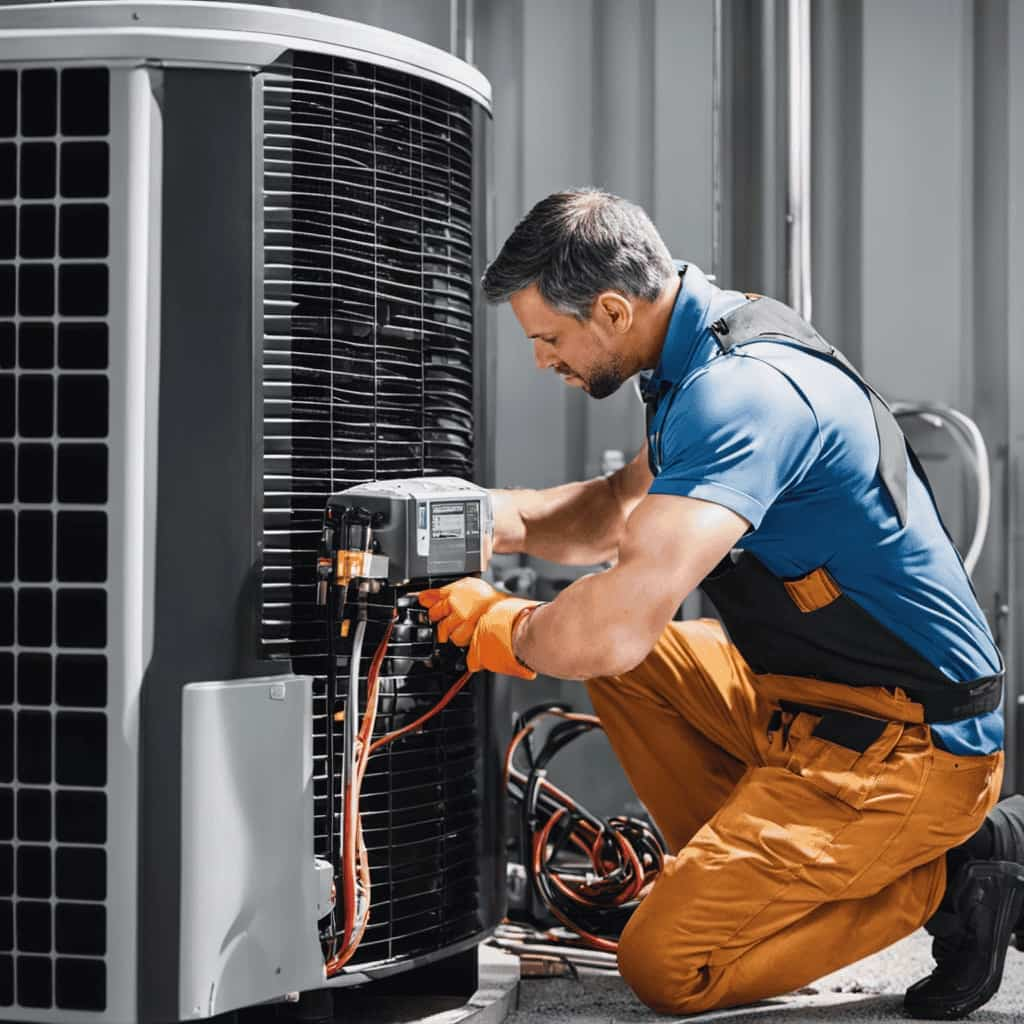
-
Comfort Optimization: Leaky ducts can lead to uneven heating or cooling throughout your home, causing discomfort in certain areas. By sealing the ductwork, you can achieve more consistent temperatures, enhancing comfort levels for everyone in your household.
-
Indoor Air Quality: Leaky ducts can allow dust, allergens, and pollutants to enter your living spaces. Properly sealed ductwork helps maintain better indoor air quality by preventing these contaminants from circulating throughout your home.
-
Extended Equipment Lifespan: Leaky ducts can strain your heating and cooling system, leading to premature wear and tear. By sealing the ductwork, you can reduce the workload on your equipment, potentially extending its lifespan and reducing the need for costly repairs or replacements.
Sealing ductwork not only improves energy efficiency but also enhances comfort, indoor air quality, and equipment longevity. In the next section, we’ll explore how proper sealing improves efficiency even further.
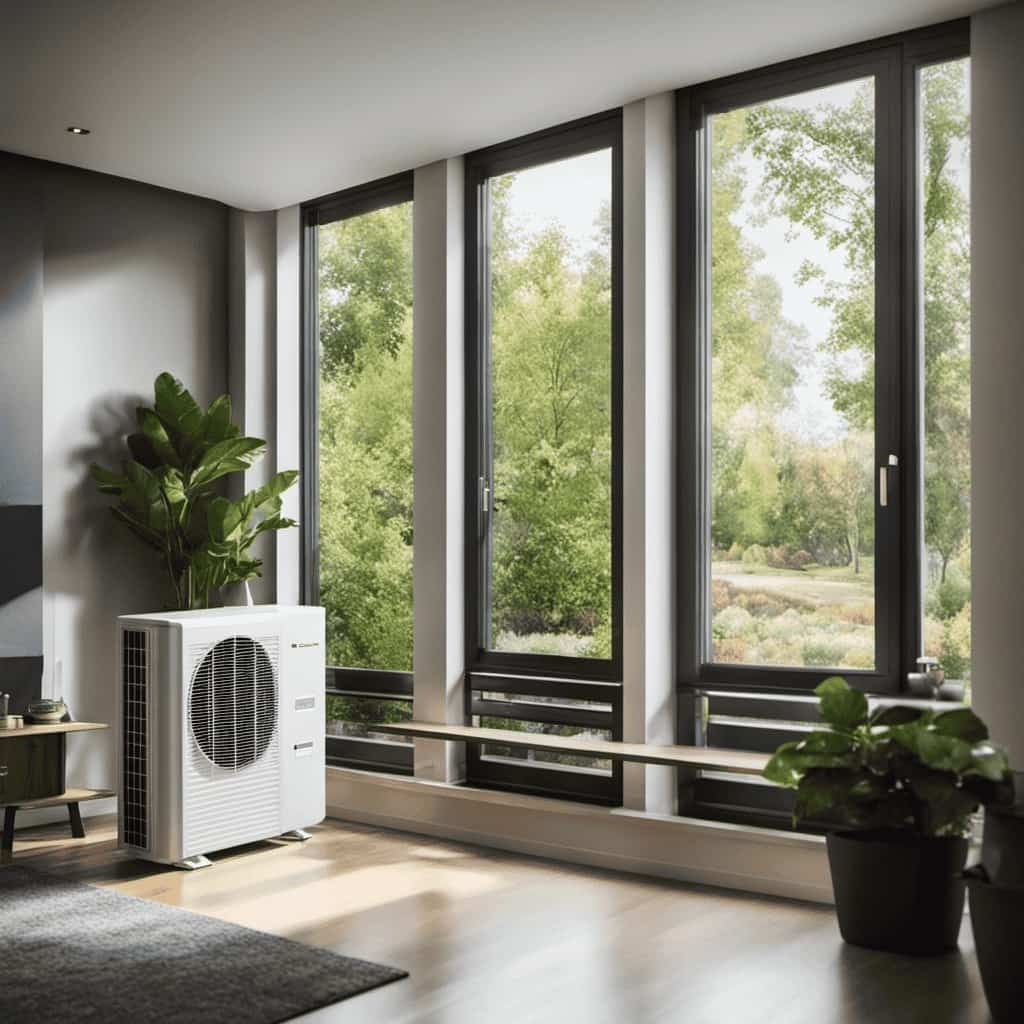
Proper Sealing Improves Efficiency
To maximize efficiency, we recommend inspecting and sealing the ductwork to prevent air leaks. Proper sealing techniques are essential for ensuring that your heat pump operates at its highest efficiency.
Over time, ductwork can develop leaks and cracks, causing air to escape and reducing the overall performance of your system. By inspecting and sealing your ductwork, you can prevent air leaks and improve energy efficiency.
Start by visually inspecting your ducts for any visible signs of damage. Next, use mastic sealant or metal tape to seal any gaps or cracks. Additionally, insulating your ductwork can further improve energy efficiency by preventing heat loss or gain.
Regular ductwork inspection and sealing should be a part of your routine heat pump maintenance to ensure optimal performance and energy efficiency.
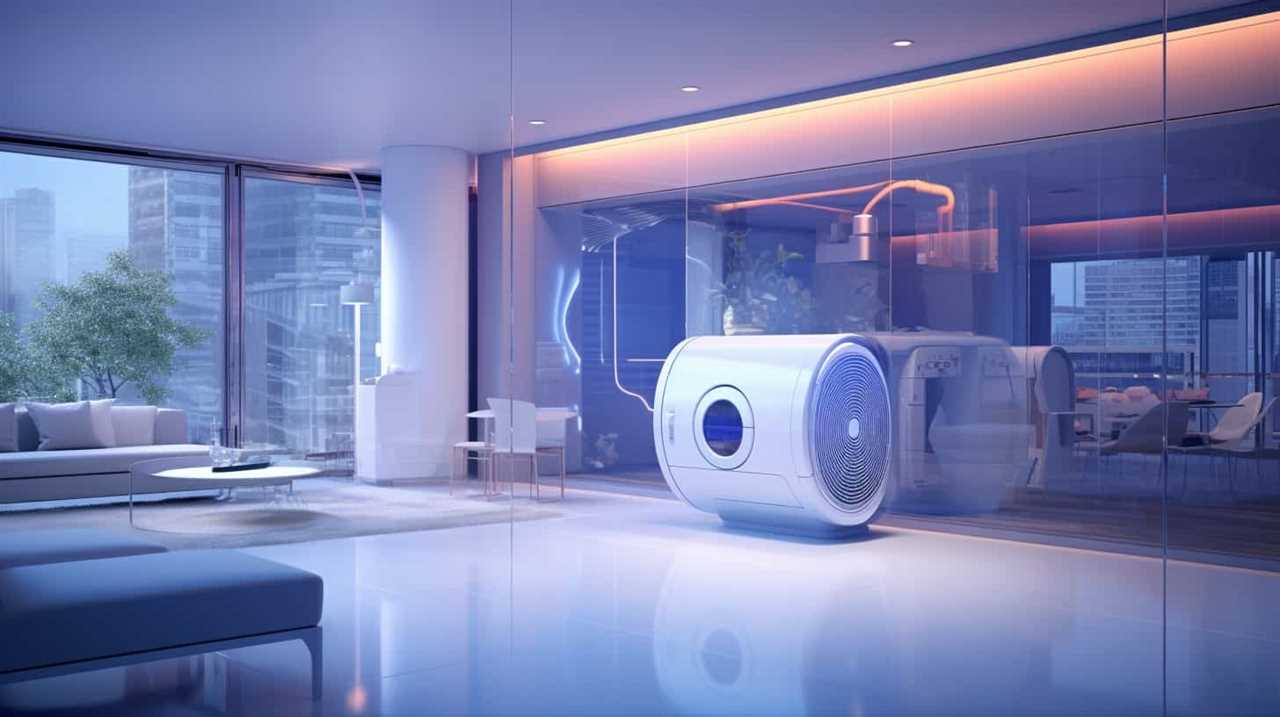
Regular Inspections Prevent Leaks
For optimal energy efficiency, we recommend regular inspections of the ductwork to detect and seal any leaks. By preventing leaks in the ductwork, you can maximize the performance of your heat pump system and reduce energy waste.
Here are four maintenance benefits of conducting regular inspections and sealing any leaks in your ductwork:
-
Improved energy efficiency: Leaks in the ductwork can result in significant energy loss, as conditioned air escapes into unconditioned spaces. By sealing these leaks, you can ensure that the heated or cooled air reaches its intended destination, reducing energy consumption and lowering your utility bills.
-
Enhanced comfort: Leaks in the ductwork can lead to uneven heating or cooling, with certain areas of your home feeling too hot or too cold. By sealing these leaks, you can achieve more balanced airflow, resulting in improved comfort throughout your living spaces.
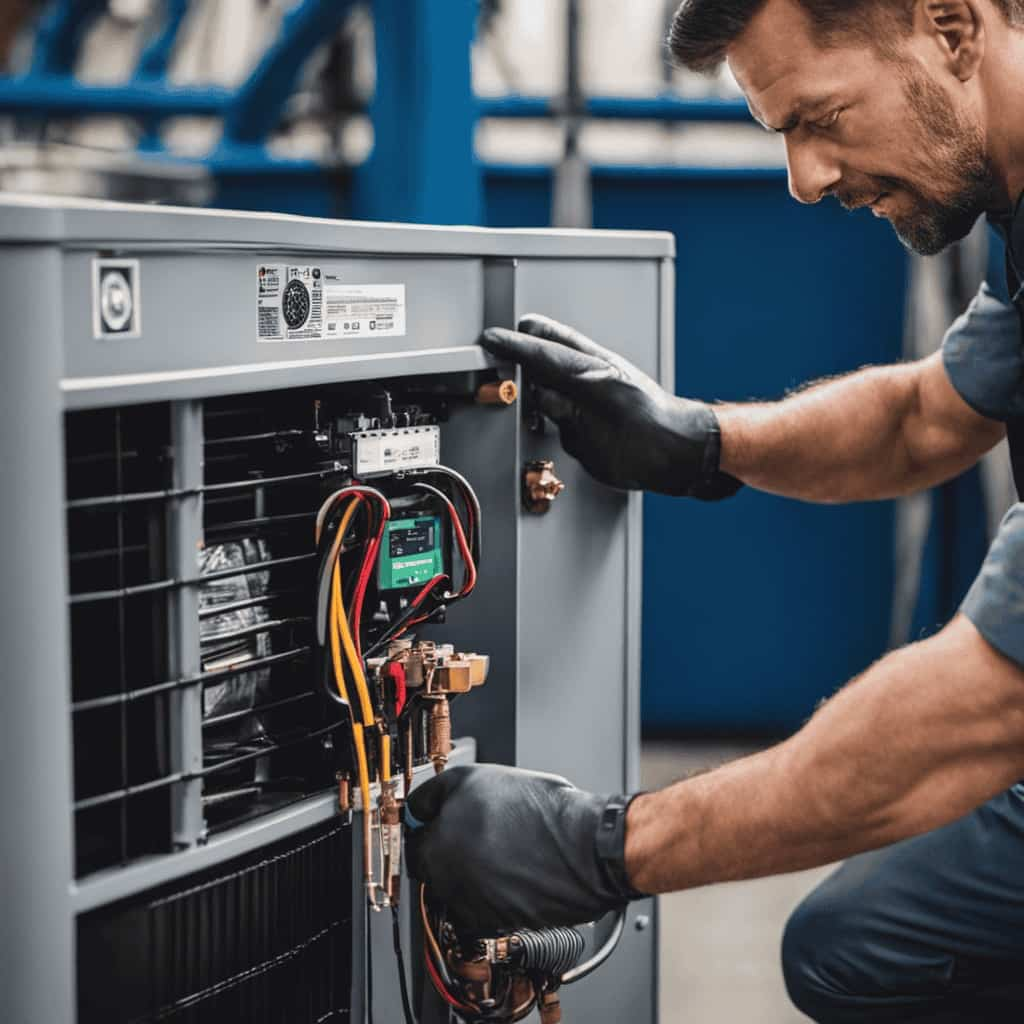
-
Extended equipment lifespan: When your ductwork is properly sealed, your heat pump doesn’t have to work as hard to deliver the desired temperature. This reduced strain on the system can prolong its lifespan and minimize the need for costly repairs or replacements.
-
Improved indoor air quality: Leaks in the ductwork can allow dust, dirt, and other contaminants to enter the system and circulate throughout your home. By sealing these leaks, you can prevent the infiltration of pollutants, improving the overall indoor air quality and creating a healthier living environment for you and your family.
Regular inspections and sealing of ductwork are essential for leak prevention and to enjoy the maintenance benefits mentioned above. Don’t overlook this crucial step in ensuring the energy efficiency and performance of your heat pump system.
Utilizing Ceiling Fans
Ceiling fans can help increase energy efficiency by circulating air and creating a cooling effect, resulting in potential energy savings of up to 10%. When used in conjunction with a heat pump, ceiling fans can enhance the overall performance of the system by improving air circulation. By distributing the conditioned air more effectively throughout the room, ceiling fans help eliminate hot and cold spots, ensuring a more comfortable environment.

Take a look at the table below to see some of the benefits of utilizing ceiling fans:
| Ceiling Fan Benefits |
|---|
| Improved air circulation |
| Energy savings |
| Enhanced comfort |
| Better distribution of conditioned air |
| Reduced strain on the heat pump |
Implementing Zoning Systems
When it comes to implementing zoning systems in our homes, there are several key points to consider.
First, zoning systems can help reduce energy waste by allowing us to heat or cool specific areas of our homes based on occupancy or usage. This targeted approach ensures that energy isn’t wasted on heating or cooling unused spaces.
Additionally, zoning systems enhance temperature control by allowing us to set different temperatures for different zones, providing personalized comfort throughout our homes.
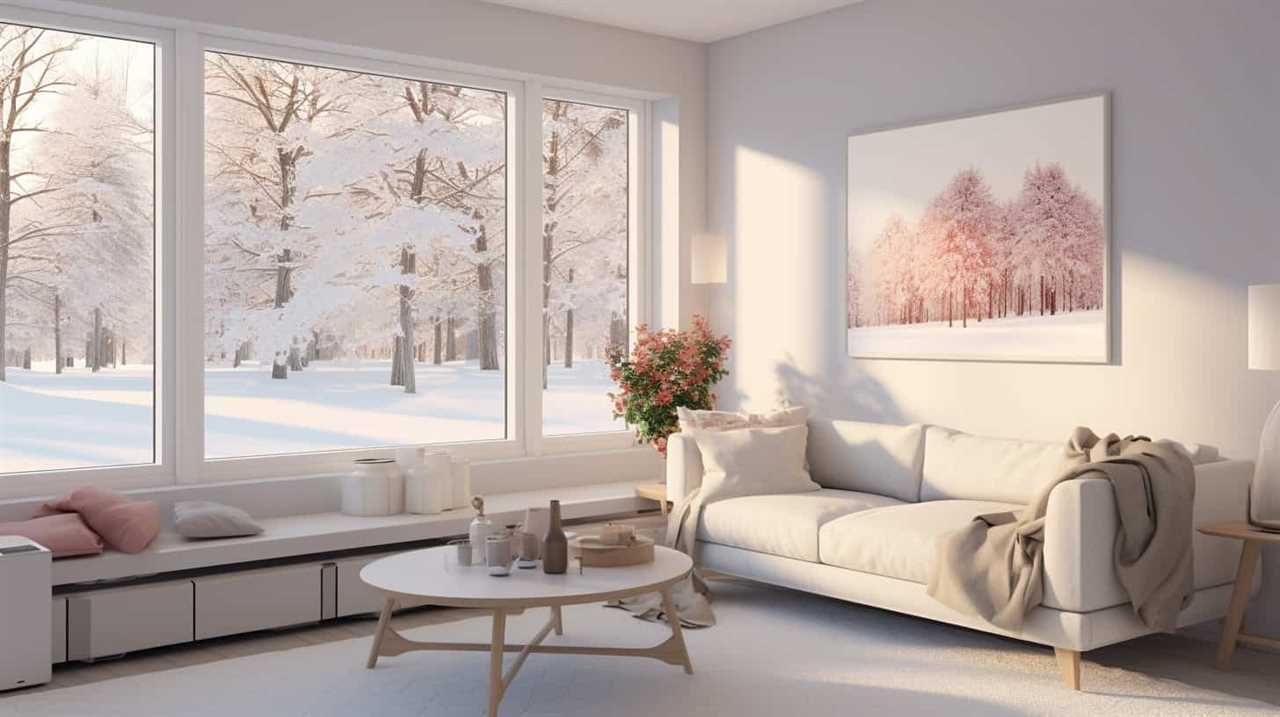
Lastly, zoning systems optimize heat distribution by directing warm or cool air to the areas that need it most, ensuring balanced comfort and energy efficiency.
Reducing Energy Waste
Let’s explore how we can maximize heat pump energy efficiency by implementing zoning systems to reduce energy waste. Zoning systems are a smart technology solution that can help homeowners effectively control the temperature in different areas of their homes.
Here are four ways implementing zoning systems can reduce energy consumption and minimize waste:
-
Tailored comfort: Zoning systems allow you to set different temperatures in different zones, ensuring that each area is only heated or cooled when needed. This personalized approach prevents unnecessary energy usage.
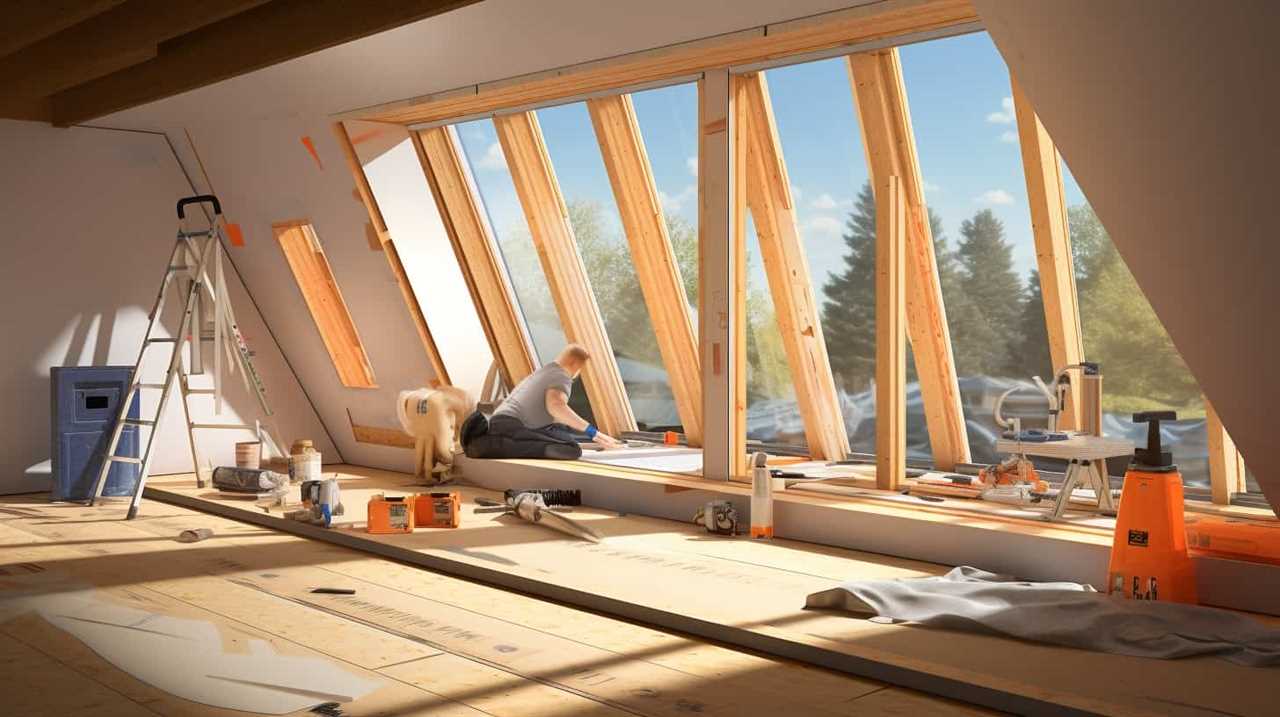
-
Energy savings: By heating or cooling only the occupied areas, zoning systems help reduce energy waste, resulting in significant cost savings on your energy bills.
-
Optimal efficiency: With zoning systems, you can prioritize areas that need more heating or cooling, while reducing energy usage in less frequently used spaces. This targeted approach ensures that your heat pump operates at its highest efficiency.
-
Environmental benefits: By implementing zoning systems, you actively contribute to reducing your carbon footprint. By minimizing energy waste, you’re helping to conserve valuable resources and protect the environment.
Implementing zoning systems is a practical step towards reducing energy waste and maximizing heat pump efficiency.
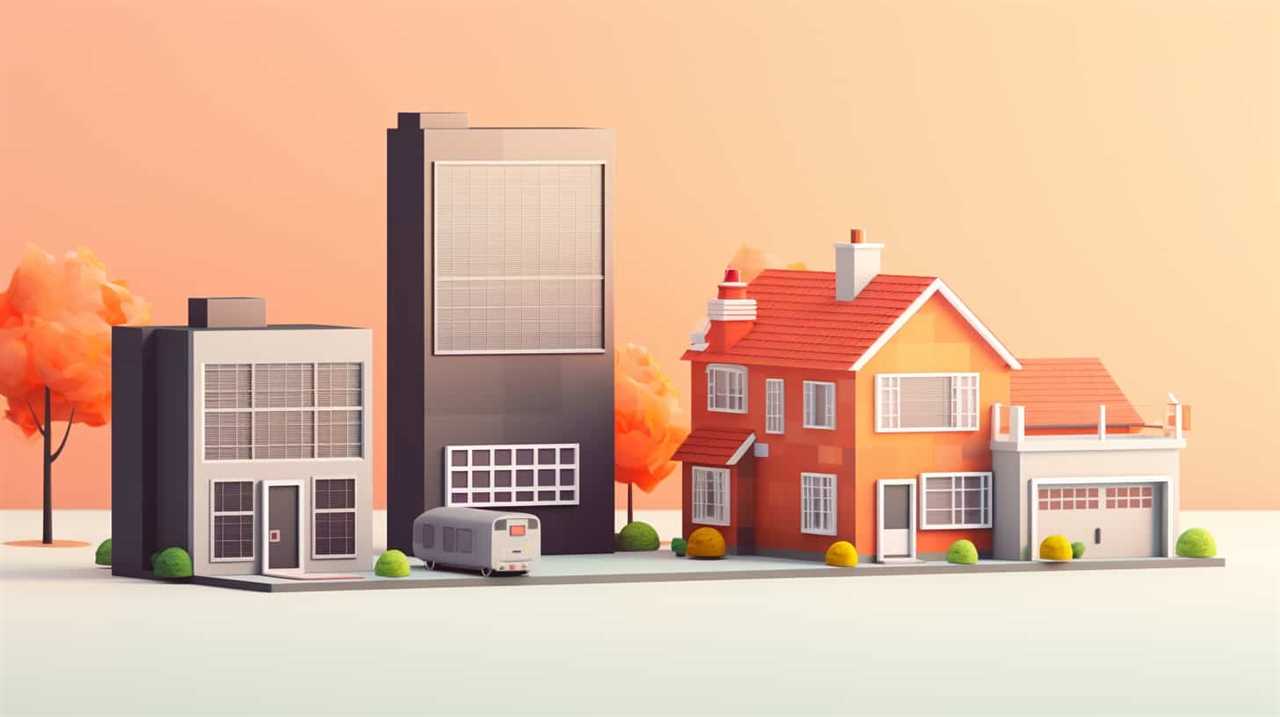
Enhancing Temperature Control
We can enhance temperature control and maximize heat pump energy efficiency by implementing zoning systems, which allow us to regulate different areas of our homes with precision and effectiveness. By dividing our homes into separate zones, we can customize the temperature settings in each area based on individual preferences and usage patterns. This not only improves comfort but also reduces energy waste by avoiding unnecessary heating or cooling in unoccupied rooms. To further optimize temperature control, it is important to improve thermostat accuracy. Regular calibration and placement of thermostats away from direct sunlight or drafts can help achieve more accurate temperature readings. Additionally, maximizing air circulation within each zone can enhance temperature distribution and improve overall comfort. By implementing zoning systems, we can achieve better temperature control, energy efficiency, and a more comfortable living environment.
| Benefits of Implementing Zoning Systems |
|---|
| 1. Customizable temperature settings based on individual preferences |
| 2. Reduced energy waste by avoiding unnecessary heating or cooling in unoccupied rooms |
| 3. Enhanced comfort and improved temperature distribution within each zone |
Optimizing Heat Distribution
To ensure efficient heat distribution throughout our homes, we can optimize the use of zoning systems and implement strategies such as adjusting damper settings and utilizing smart thermostats. Here are four ways to optimize airflow and achieve effective heat distribution:
-
Install a zoning system: This system allows you to divide your home into different zones and control the temperature in each zone individually. By doing so, you can direct heat to the areas that need it the most, avoiding unnecessary heating in unoccupied or lesser-used spaces.
-
Adjust damper settings: By adjusting the dampers in your HVAC system, you can regulate the airflow to different areas of your home. This helps in directing heat where it’s needed and prevents it from being wasted in areas that don’t require as much heating.

-
Utilize smart thermostats: Smart thermostats allow you to program and control the temperature in each zone of your home. They can automatically adjust the temperature based on occupancy or time of day, ensuring optimal comfort and energy efficiency.
-
Balance the system: Ensure that your HVAC system is properly balanced by adjusting the airflow in each zone. This helps in maintaining consistent temperatures throughout your home and prevents hot or cold spots.
Utilizing Energy-Efficient Window Treatments
Using energy-efficient window treatments can significantly improve the energy efficiency of our heat pump system. By properly choosing and utilizing energy saving curtains and window shades, we can reduce heat loss during winter and prevent unwanted heat gain during summer.
Energy saving curtains are designed with thermal properties that help insulate the windows, preventing heat transfer. These curtains are typically made of thick, tightly-woven fabrics that act as a barrier against drafts and cold air infiltration. Window shades, on the other hand, can be adjusted to control the amount of sunlight entering the room. By blocking direct sunlight, window shades reduce the need for air conditioning and help maintain a comfortable indoor temperature.

By combining energy saving curtains with window shades, we can create a more energy-efficient environment, reducing the workload on our heat pump system and ultimately saving on energy costs.
| Curtain Type | Materials | Benefits |
|---|---|---|
| Thermal curtains | Thick, tightly-woven fabrics | Insulates windows, reduces heat loss |
| Blackout curtains | Light-blocking materials | Blocks sunlight, reduces heat gain |
| Insulated shades | Cellular or roller shades with insulation | Controls light and temperature, reduces energy consumption |
Monitoring and Adjusting Refrigerant Levels
Regularly checking and appropriately adjusting refrigerant levels is essential for maximizing the energy efficiency of our heat pump system. By maintaining optimal refrigerant levels, we can ensure that our heat pump operates at peak performance, reducing energy consumption and prolonging the system’s lifespan.
Here are four key steps to effective refrigerant maintenance and monitoring:
-
Conduct regular inspections: Schedule routine checks to assess the refrigerant levels in the system. This will help identify any potential leaks or issues that may affect the system’s efficiency.
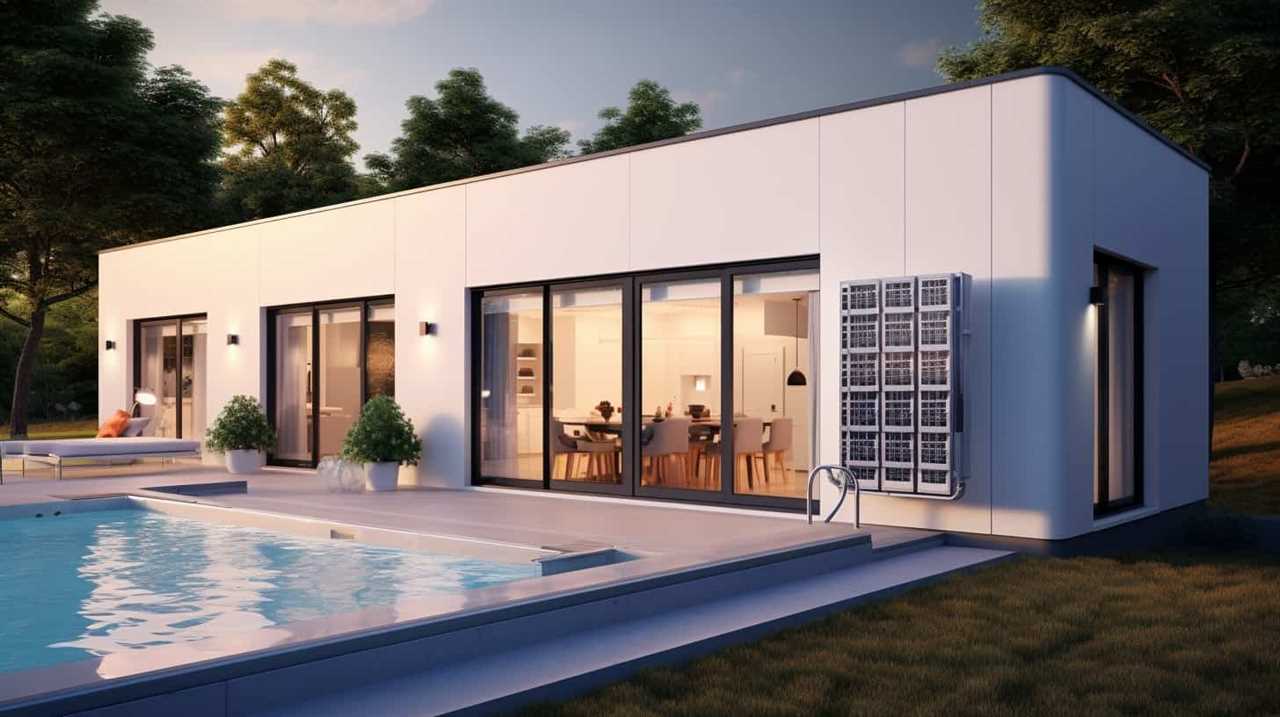
-
Monitor pressure levels: Keep an eye on the pressure readings of the refrigerant to ensure they’re within the manufacturer’s recommended range. Deviations from these levels may indicate a problem that needs attention.
-
Adjust refrigerant levels: If the pressure levels are too low or too high, it’s crucial to adjust the refrigerant accordingly. Consult the manufacturer’s guidelines or seek professional assistance to make the necessary adjustments.
-
Address leaks promptly: Leaks can lead to refrigerant loss, compromising the system’s performance and energy efficiency. If any leaks are detected, they should be identified and repaired promptly to prevent further issues.
Taking Advantage of Heat Pump Rebates and Incentives
We can maximize our heat pump energy efficiency by taking advantage of available rebates and incentives. Many utility companies, government agencies, and other organizations offer financial incentives for homeowners who invest in energy-efficient home improvements, including heat pump maintenance or upgrading to a high-efficiency heat pump model. These incentives can help offset the initial costs and make energy-efficient upgrades more affordable.

Some rebates may offer a percentage of the total cost of the heat pump or cover a portion of the installation expenses. It’s important to research and understand the specific requirements and eligibility criteria for each rebate or incentive program.
By utilizing these opportunities, we can’t only save on energy bills but also contribute to a more sustainable future.
Speaking of upgrading to a high-efficiency heat pump model…
Upgrading to a High-Efficiency Heat Pump Model
To further enhance our heat pump energy efficiency, we can upgrade to a high-efficiency heat pump model and, in turn, reduce our energy consumption and costs.
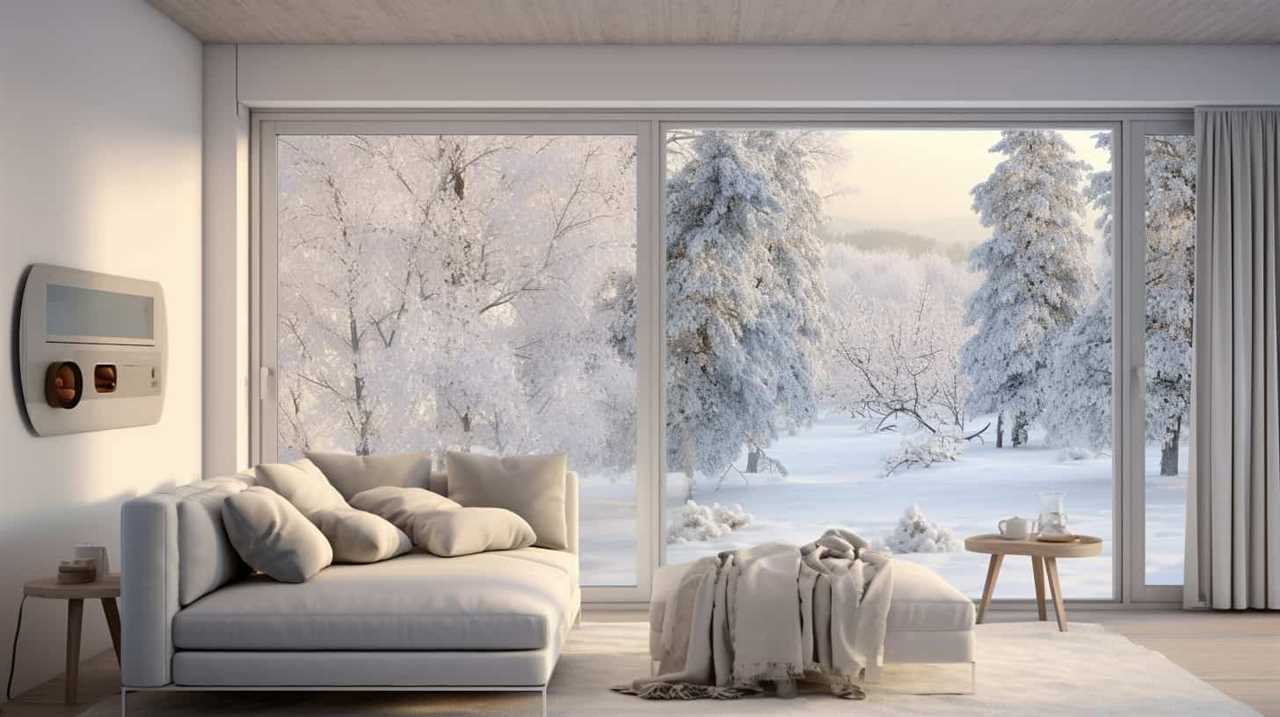
Here are four reasons why upgrading to a high-efficiency heat pump is beneficial and cost-effective:
-
Energy savings: High-efficiency heat pumps are designed to maximize energy efficiency, resulting in significant savings on your utility bills. These models use advanced technology to extract heat from the air or ground more efficiently, reducing the amount of electricity needed to heat or cool your home.
-
Environmental impact: By upgrading to a high-efficiency heat pump, you can reduce your carbon footprint and contribute to a greener environment. These models use less energy, resulting in lower greenhouse gas emissions and a more sustainable heating and cooling solution.
-
Enhanced comfort: High-efficiency heat pumps provide consistent and precise temperature control, ensuring optimal comfort throughout your home. These models are designed to deliver efficient heating and cooling performance, regardless of the outdoor temperature.
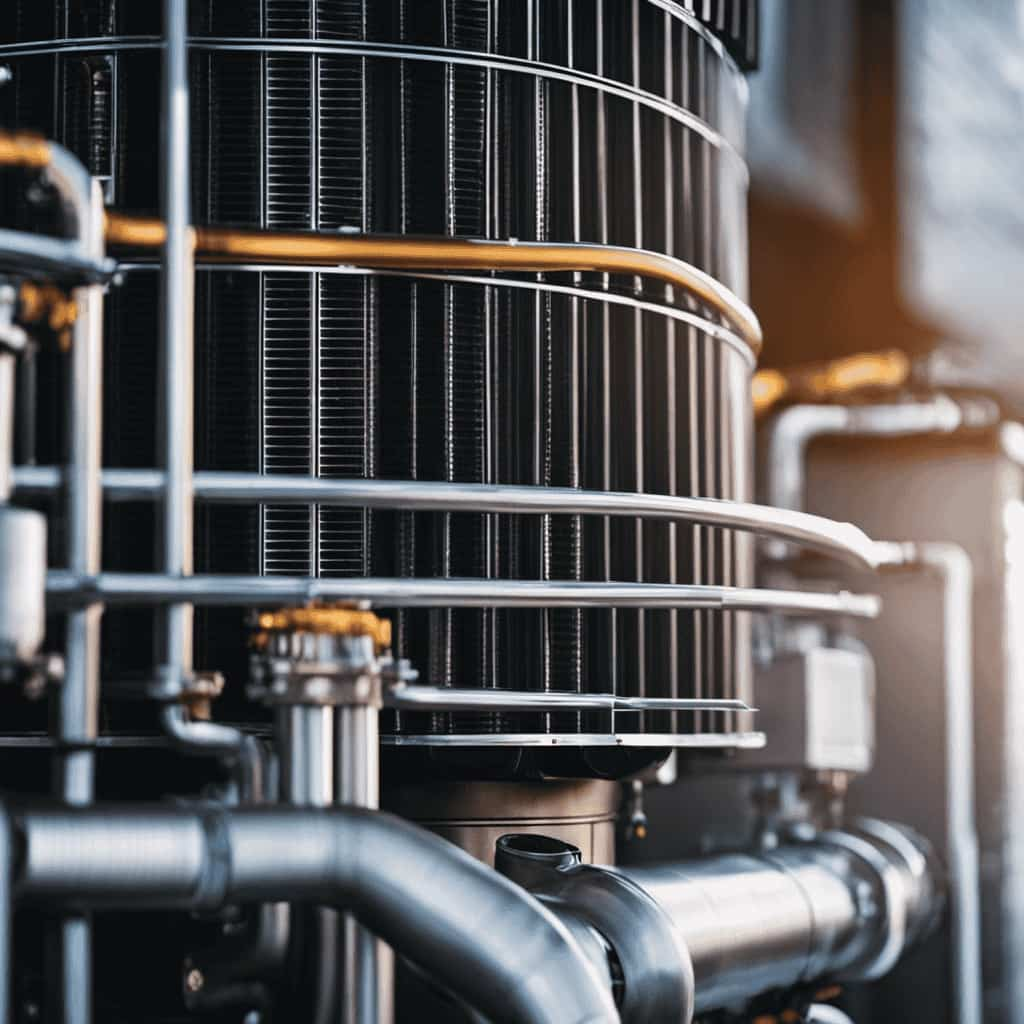
-
Long-term savings: While high-efficiency heat pumps may have a higher upfront cost, they offer long-term savings through reduced energy consumption and lower maintenance requirements. With proper installation and regular maintenance, these models can provide reliable and cost-effective heating and cooling for many years to come.
Frequently Asked Questions
Are Heat Pumps Suitable for All Climates?
Heat pumps can be suitable for all climates, but their efficiency and performance may vary. Factors such as temperature extremes, insulation, and system size can affect heat pump efficiency. Regular maintenance and proper usage can help optimize performance.
Can I Install a Heat Pump Myself?
Installing a heat pump yourself may seem tempting, but it’s important to hire professionals. DIY installation can lead to costly mistakes and safety hazards. According to a study, 85% of heat pump installations are done by professionals.
How Long Does a Heat Pump Typically Last?
Heat pumps typically last around 15-20 years with proper heat pump maintenance. Signs of heat pump failure include inadequate heating or cooling, unusual noises, and increased energy consumption. Regular maintenance can extend the lifespan of your heat pump.
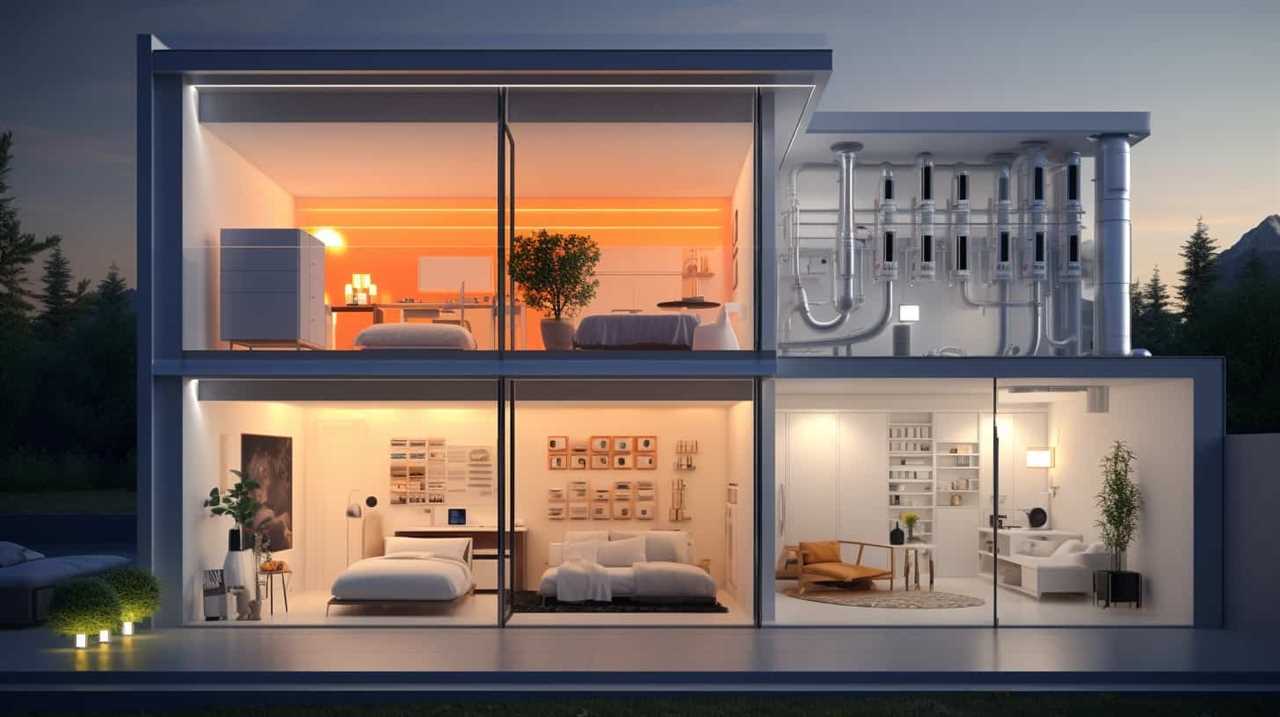
Are Heat Pumps Noisy?
Heat pumps can be noisy, but there are ways to reduce the noise. For example, opting for quiet heat pump models and installing noise-reducing features can help create a quieter and more comfortable environment.
Do Heat Pumps Require a Backup Heating System?
Yes, backup heating systems may be needed in certain situations. It depends on factors like climate and heat pump installation. It’s important to consult with professionals to determine if a backup system is necessary.
Conclusion
In conclusion, by implementing these curated tips, we can significantly enhance the energy efficiency of our heat pumps.
Regular maintenance, optimal temperature settings, and proper insulation are crucial for maximizing performance.
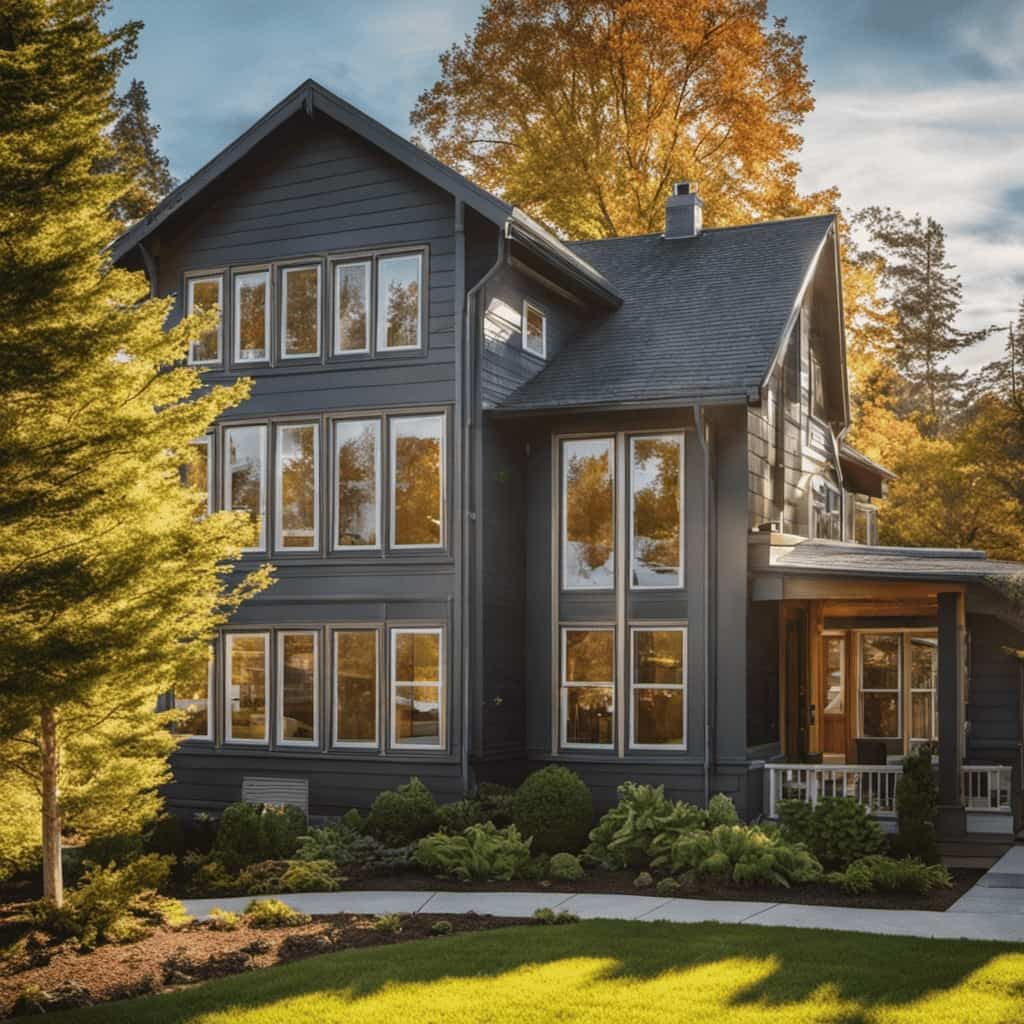
Additionally, utilizing programmable thermostats and energy-efficient window treatments can further reduce energy consumption.
Monitoring refrigerant levels and taking advantage of rebates and incentives are also essential for optimizing efficiency.
Lastly, consider upgrading to a high-efficiency heat pump model for even greater savings.
Remember, ‘a stitch in time saves nine,’ so investing in these measures now will pay off in the long run.
